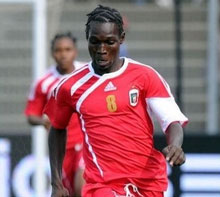
Blatantly broken FIFA rules
According to Africa's biggest soccer site, Kickoff.com, Equatorial Guinea have blatantly broken FIFA rules, by fielding players from neighbouring countries, such as Cameroon, Cote d'Ivoire, Nigeria and Senegal (and even Brazil), all fast-tracked in record time as Equatorial Guinea citizens.
This calls into question a number of FIFA regulations that were introduced several years ago in order to stop countries handing passports to 'bought' players. Instead, players who seek to play for countries other than their own must prove they have blood ties to their new country or must serve a minimum three-year residency period.
Much to the amazement of international observers, the tiny but oil rich country has transformed their women's team in record time from one of the minnows of African football to serious contenders in the women's global game.
Following their final Group B game last Monday, the Ghanaian team has now said that the Guinean side included men in her team. Black Queens' team captain Florence Okoe said no one can make her yield in her belief that star striker Salimata Simpore was "a boy playing in a girls' game", saying that "It is not as if we are throwing sour grapes, just because we have lost. Rather, this is the fact and it is up to the organisers to do something about this. It is not good for African women football."
Her colleague, Diana Ankomah, echoed the statement, saying that "losing to an unequal opposition like in this case of Equatorial Guinea is painful. You only need to have physical contact with them to know this, and we can tell from what happened most times during the match."
In the meantime, Equatorial Ghana's gender controversy has made international media waves as far afield as Belgrade, Serbia, whose sports broadcaster, Sportske, ran an article titled "Muškobanjasta reprezentacija" ('Masculine Representation: Equatorial Guinea smuggling gentlemen into the women's game').
A similar incident occurred at the previous AWC tournament held in Equatorial Guinea in 2008, when a request was fielded by Cameroon to investigate three players from the hosting team who were suspected to be men.
Cameroon's protest was joined by the Vice President of the Nigerian Football Federation, Amanze Uchegbulam, who pleaded that the organisers take action to ensure a level playing field. "We know that the organizers may not take action but we feel strongly about this. There are two players in the Equatorial Guinea team whose gender is doubtful and CAF will do this competition a lot of good if their gender can be cleared. "It is a competition where all the teams should have level playing field, including on gender matter," said Uchegbulam.
Fair play is at the very heart of the 'beautiful game' and bending rules to the detriment of the opponent has the potential to not only wreck the reputation of an entire tournament, but also to kill the interest in the game invested by spectators and sponsors alike.
Already, as it is, the African Women's Championship does barely attract a fraction of their male counterparts' tournament, and can hardly afford scaring away existing and potential sponsors. As evidenced by the Castor Semenya saga, gender controversy is an emotionally loaded territory that can easily taint the image of a sport that wields tremendous influence amongst aspiring youth and is often hailed as a school of life.
After an earlier protest from Cameroon that Equatorial Guinea were fielding ineligible players at the 2010 AWC - something CAF dismissed "until a full investigation could be launched" -, the Confederation of African Football (CAF) is still to comment on the issue as this is the second tournament in a row that the Guineans have been accused of gender cheating.
The snail pace of launching an investigation and getting to the bottom of this matter is now casting a major shadow on the credibility of the women's game on the continent. Furthermore, should the United Nations team of Equatorial Guinea beat the Super Falcons from Nigeria in Sunday's final, this controversy might take on a dimension that could haunt the future of this tournament longer than we might want to remember.
